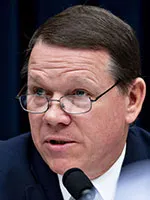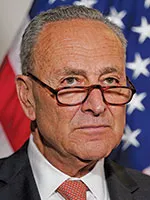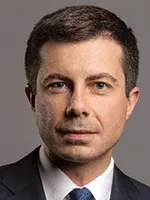Senior Reporter
New Speaker Johnson Faces Array of Pressing Issues

[Stay on top of transportation news: Get TTNews in your inbox.]
For the new speaker of the U.S. House of Representatives, the fall agenda is jam-packed with a variety of pressing issues.
From determining the degree of aid for foreign conflicts in Europe and the Middle East to averting a partial government shutdown, the legislative tasks before Speaker Mike Johnson (R-La.) will completely engross him.
“As speaker, I will ensure the House delivers results and inspires change for the American people. We will restore trust in this body. We will advance a comprehensive conservative policy agenda,” Johnson said shortly after ascending to the speakership.
Also on the chamber’s radar are myriad policy proposals affecting the aviation industry and water resources operations, to name a few.

Johnson
The chairman of the House transportation committee, Rep. Sam Graves (R-Mo.), detailed the policy matters awaiting consideration.
“Congratulations to Mike Johnson on being elected to serve as the next speaker of the House of Representatives. Throughout his time in Congress, Speaker Johnson has been a consistent and passionate champion of conservative principles, and I look forward to working alongside him and all House Republicans to deliver on the promises we made to the American people,” Graves emphasized Oct. 25. “In the Transportation and Infrastructure Committee, we will continue pursuing an active agenda that includes tackling ongoing energy and supply chain challenges, long-term reauthorizations of the Federal Aviation Administration, the Coast Guard and pipeline safety programs.”

Graves
Specific to aviation, the Senate recently confirmed Michael Whitaker to lead FAA while congressional leaders insist they aim to advance an FAA policy update reauthorization before the start of the new year.
Additionally, Graves intends to continue with the panel’s examination of 2021’s bipartisan infrastructure law. The $1.2 trillion Infrastructure Investment and Jobs Act is dedicating billions of dollars for connectivity programs nationwide.
A careful accounting of those funds is Graves’ priority. Or, as he put it: “Guarding against waste, fraud and abuse as the Infrastructure [Investment] and Jobs Act is implemented.”
He added, “It’s time for the House to get back to work, and that includes moving strong legislation that is critical to America’s infrastructure.”

Schumer
On the other side of the Capitol, Senate Majority Leader Chuck Schumer (D-N.Y.) is prioritizing the consideration of a supplemental funding request for disaster relief as well as foreign policy conflicts.
“Democrats are working with the administration on a domestic supplemental to support the needs of American families,” Schumer said Oct. 26. “Our domestic supplemental will fund bipartisan priorities for Americans like disaster response, securing American energy independence, fighting the scourge of fentanyl, expanding access to affordable high-speed internet, and so much more.”
The Senate this week also is likely to vote on fiscal 2024 transportation legislation. The aim is to advance appropriations bills before a Nov. 17 government funding deadline.
The Senate’s fiscal 2024 measure would provide $98.9 billion for the departments of Transportation and Housing and Urban Development. It would dedicate $20.2 billion for the Federal Aviation Administration, $16.8 billion for the Federal Transit Administration and $3.4 billion for the Federal Railroad Administration. The bill also would provide the Federal Motor Carrier Safety Administration with nearly $1 billion. The House $90.2 billion fiscal 2024 bill also would dedicate nearly $1 billion for FMCSA. Specific to other agencies, the House bill would provide $19.5 billion for FAA, $14.6 billion for FTA and $1.4 billion for FRA.
The Week Ahead (All time Eastern)
Nov. 1, 10 a.m.: Senate Environment and Public Works Committee meets for a hearing titled, “The Science of Extreme Event Attribution: How Climate Change Is Fueling Severe Weather Events.” Witnesses include Michael Wehner, senior scientist at Applied Mathematics and Computational Research Division at the Lawrence Berkeley National Laboratory; and Jennifer Jurado, chief resilience officer and deputy director at the Resilient Environment Department, Broward County, Florida.
Freight Corridor
We’ve arrived at the intersection of infrastructure and equity.
Legislative Docket

Whitaker
The Senate on Oct. 24 confirmed Michael Whitaker to lead the Federal Aviation Administration. Whitaker’s nomination had advanced to the chamber floor for consideration the previous week.
“Mr. Whitaker is highly qualified with more than 30 years of aviation experience in both the public and private sectors,” committee Chairwoman Maria Cantwell (D-Wash.) said. House Transportation and Infrastructure Committee Chairman Sam Graves (R-Mo.) and Aviation Subcommittee Chairman Garret Graves (R-La.) issued a joint statement on Whitaker’s confirmation.
“We want to congratulate Michael Whitaker on being confirmed as the next administrator of the FAA. This is a critical time for aviation, and the FAA has been without an administrator for far too long. Mr. Whitaker’s confirmation will provide much needed stability and certainty for the agency and the broader aviation industry as a whole.”
 Buzz
Buzz
At a recent event with a focus on infrastructure matters, Transportation Secretary Pete Buttigieg highlighted the U.S. Department of Transportation’s ongoing commitment to improving safety.

Buttigieg
“So much has changed so quickly. But our basic purpose is very consistent and very steady. The environment isn’t simple. The work isn’t simple. But the priorities are simple: To make transportation safer. To use transportation to support economic growth. To ensure transportation develops in an equitable fashion. To make sure transportation is part of the solution to climate change. And to make sure that innovation in the field of transportation unfolds in ways that are good for those four priorities of safety, jobs, equity and climate,” the secretary said Oct. 19 at the Forum Club of the Palm Beaches. The National Highway Traffic Safety Administration determined that 42,795 individuals died in motor vehicle traffic crashes in 2022.
Favorite Video
The one about the new speaker of the House.
Favorite Tweet
When all you need is love.
A ~lighthearted~ moment in Senate Judiciary this morn:
WHITEHOUSE: Grassley's office is the hottest spot to get married
KLOBUCHAR: 20 marriages!
GRASSLEY:
BOOKER: I just wanna know, any openings in Grassley's office?
DURBIN: We'll have to get you an Iowa mailing address. pic.twitter.com/nD6s80WQ9l — Josh Sorbe (@joshsorbe) October 26, 2023
The Last Word
[Vehicle-to-everything] connectivity is a critical transformational technology that not only advances safety but also enhances mobility and efficiency.
Federal Highway Administration Chief Shailen Bhatt on Oct. 26
Image
We publish Mondays when Congress is in session. See previous installments of Capitol Agenda here. Email emulero@ttnews.com with tips. Follow us @eugenemulero and @transporttopics.
Want more news? Listen to today's daily briefing below or go here for more info:



